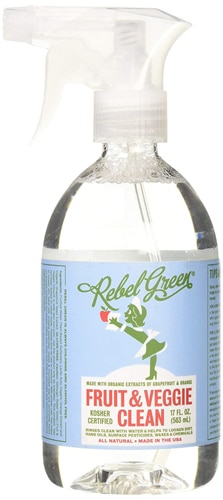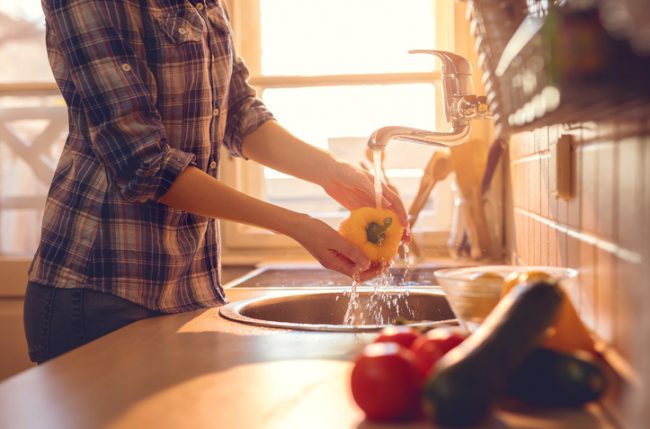Chances are, your parents or teachers constantly nagged you to wash your hands when you were a kid. We hope those reminders have stuck with you.
Now, though, there’s another directive about washing that you should be following, particularly in light of a new report from a nonprofit organization.
The report, issued by the Environmental Working Group (EWG), identifies 12 conventionally grown (or non-organic) fruits and vegetables that contain the highest levels of pesticide residue. The worst offender among the “Dirty Dozen” was strawberries, followed by spinach, nectarines, apples, grapes, peaches, cherries, pears, tomatoes, celery, potatoes and sweet bell peppers/hot peppers.
“It is vitally important that everyone eats plenty of produce, but it is also wise to avoid dietary exposure to toxic pesticides, from conception through childhood,” Sonya Lunder, a senior analyst at EWG, says in a news release.
So, aside from buying organic fruits and vegetables, how do you try to avoid pesticide residue? Is it possible to wash conventionally grown fruits and vegetables so that your peaches and pears aren’t harboring pesticide residue?
Unfortunately, doing so might not completely banish chemicals from your berries.
Experts at Colorado State University Extension say no washing method entirely removes or kills potentially harmful residue or germs that might show up on fruits and vegetables. However, they add, studies show that thoroughly rinsing fresh produce under running water can help remove pesticide residue, as well as dirt, bacteria and pests.
Colorado State University Extension offers these tips:
- Under running water, rub fruits and vegetables briskly with your hands to remove dirt and surface microorganisms.
- Make sure the water used for washing is no more than 10 degrees colder than the fruits and vegetables to prevent microorganisms from entering into the stem or blossom end.
- Consider using a vegetable brush to scrub fruits and vegetables that have a hard rind or firm skin.
- Don’t wash fruits and vegetables with detergent or bleach solutions. Many types of fresh fruits and vegetables are porous and might absorb these chemicals.
- Chemical rinses and other treatments for washing raw produce — often known as fruit and vegetable washes — shouldn’t be used. Why? The U.S. Food and Drug Administration (FDA) says their effectiveness hasn’t been evaluated and the safety of their residues hasn’t been tested.
While organic fruits and vegetables are regarded as better for you and the environment, they also should be washed like conventionally grown produce.
Colorado State University Extension suggests taking extra steps to wash leafy green vegetables. It’s recommended that you immerse the leaves in a bowl of cold water to help remove sand and dirt. Adding vinegar to the water (½ cup distilled white vinegar per 1 cup water), followed by a clean water rinse, has been proven to decrease bacterial contamination, the extension service says.
Meanwhile, new research indicates that washing apples with a 1 percent baking soda-and-water mixture is more effective than water alone or a bleach solution approved by the U.S. Environmental Protection Agency (EPA) in reducing pesticide residue.
Even if you undertake efforts to clean fruits and vegetables before eating them, some experts insist the risk of harm from pesticide residue or bacteria on produce is low. However, they explain that carefully cleaning fruits and vegetables minimizes the risk.
Regarding that risk, the Alliance for Food and Farming, a nonprofit group representing organic and conventional farmers and farms, says EWG is needlessly scaring consumers with its annual “Dirty Dozen” report.
The alliance points out that 99 percent of residues on fruits and vegetables are far below EPA safety guidelines. Furthermore, the group says, 50 percent of fruits and vegetables sampled by the FDA have no detectable residues.
“For over two decades, the authors of this [Dirty Dozen] list have inaccurately disparaged healthy and safe fruits and veggies to the detriment of consumers,” Teresa Thorne, executive director of the alliance, says in a news release. “Since a farmer’s first consumer is his or her own family, providing safe and wholesome food is always their priority. Consumers should be reassured by the farmers’ commitment to food safety and government reports that verify that safety year after year.”
Still, no produce is ready to eat after buying it at the grocery store or anywhere else, some food experts say. It’s always wise to wash fruits and vegetables before putting them on your plate or in your mouth, even if you’re planning to peel them, experts add.
Oh, and don’t forget to wash your hands regularly, such as before and after handling fruits and vegetables. You don’t want to disappoint your parents, do you?




